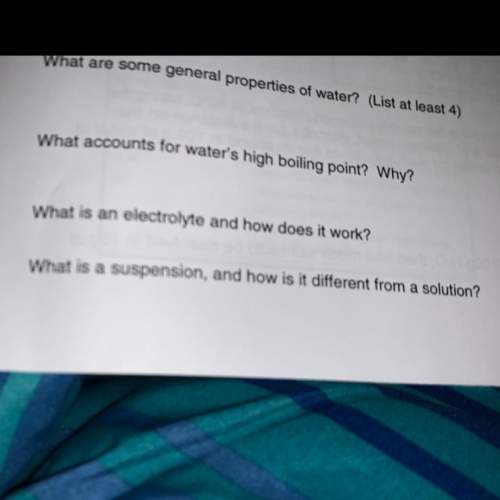
Chemistry, 20.11.2019 23:31 Jocelyn0925
For which one of the following reactions is δh°rxn equal to the heat of formation of the product? for which one of the following reactions is h°rxn equal to the heat of formation of the product? (1/2)a. n2 (g) + o2 (g) → no2(g) b. p (g) + 4h (g) + br (g) → ph4br (l)c. 12c (g) + 11h2 (g) + 11o (g) → c6h22o11 (g) d. n2 (g) + 3h2 (g) → 2nh3 (g) e. 6c (s) + 6h (g) → c6h6 (l)

Answers: 1


Another question on Chemistry

Chemistry, 22.06.2019 03:30
Asample of ammonia reacts with oxygen as shown. 4nh3(g) + 5o2(g) 4no(g) + 6h2o(g) what is the limiting reactant if 4.0 g of nh3 react with 8.0 g of oxygen? o2 because it produces only 0.20 mol of no. nh3 because it produces only 0.20 mol of no. o2 because it produces two times less no than nh3. nh3 because it produces three times more no than o2.
Answers: 3


Chemistry, 22.06.2019 08:00
Which of the following observations indicates that there is a small, dense, positively charged part in the center of an atom? some uncharged particles are scattered by a gold foil. all uncharged particles are attracted towards a gold foil. all positively charged particles pass straight through a gold foil. some positively charged particles bounce back from a gold foil.
Answers: 2

Chemistry, 22.06.2019 10:00
The reactions shown here can be combined to make the overall reaction c(s) + h2o(g) ⇌ co(g) + h2(g) by reversing some and/or dividing all the coefficients by a number. a. c(s) + o2(g) → co2(g) k=1.363×10^69 b. 2 h2(g) + o2(g) → 2 h2o(g) k=1.389×10^80 c. 2co(g) + o2 (g) → 2 co2(g) k=1.477×10^90
Answers: 1
You know the right answer?
For which one of the following reactions is δh°rxn equal to the heat of formation of the product? f...
Questions

Mathematics, 01.03.2021 14:00

Chemistry, 01.03.2021 14:00

Biology, 01.03.2021 14:00


Computers and Technology, 01.03.2021 14:00

Mathematics, 01.03.2021 14:00




Mathematics, 01.03.2021 14:00







Mathematics, 01.03.2021 14:00


Social Studies, 01.03.2021 14:00

Mathematics, 01.03.2021 14:00




